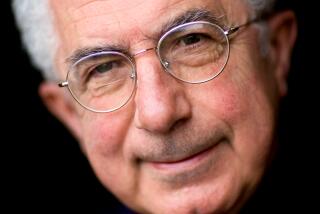How Can We Teach Them Shakespeare When They’ve Never Read Chaucer?
Thursday’s announcement by the National Endowment for the Arts that reading is down -- that fewer than half of all Americans over the age of 18 now read novels, plays, short stories or poetry, and that only 56.9% have read any book at all in the last year -- is, of course, to be abhorred. But to call it news, I think, is wrong.
This country, after all, has been split into two cultures for many years. If you go back through the history of literacy in the United States in the 19th and 20th centuries, you’ll see that we’ve always been divisible into readers and nonreaders.
Who are the readers and who are the nonreaders? It’s not as simple as you might think. It’s not a distinction that goes by social class, and it doesn’t go by income group. It isn’t a male thing or a female thing or a matter of sexual orientation or so-called white or so-called black. It’s a broad generic distinction between the people who have a fundamental passion for books and those who don’t. We haven’t yet found an adequate way to explain it and, frankly, I’m not sure that even education can affect it.
I know the children of many faculty members at Yale, for instance, who have grown up in houses just like my own, which has about 35,000 books in it, and still they have never become readers. But I also have many students who grew up poor with few books in the house but who have developed a voracious hunger for them.
If there is a drop-off in reading today, it’s partly because it’s so much harder to become a reader than it used to be. In my generation (I’m going to celebrate my 74th birthday soon), we had radio. We had movies. But there was no television. There were no computers. So as a child, I read all the time. I read in bed and out of bed. I read whenever I could sneak off, whenever I could get to a corner by myself.
Today, according to the NEA, the average American child lives in a home with 2.9 television sets, 1.8 VCRs, 3.1 radios, 2.1 CD players, 1.4 video-game players and one computer. It’s no wonder that the heads of so many Americans are stuffed with pointless information. It’s no wonder that the rate of reading is steadily dropping.
Today, according to the study, only one-third of American males read “literature” (which they have defined so broadly that it includes writers like Stephen King and Danielle Steele).
Although there have always been readers and nonreaders, it is certainly true that today’s students arrive at college less prepared for the study of literature than comparable students 30 years ago or 50 years ago.
I teach a course on how to read a poem. And I teach Shakespeare. Fall term: comedies, histories and poetry. Spring term: romances and tragedies.
I’ve learned in the last 15 years not to assume anything. Unless students are religious, I can’t take the Bible for granted. I can’t say “this has some relation to the Book of Job” because they might not know what that is.
I can’t assume they’ve read Chaucer, either. And it’s very hard to get started on Shakespeare if you haven’t read Chaucer.
It used to be that you could be pretty sure that either on their own or in a good secondary school they would have read “The Iliad” or “The Odyssey.” Not anymore. Now you have to send them to read it, along with “The Canterbury Tales” and the Book of Job.
They’ll go, of course, and they’ll read it. And they’ll grasp it immediately. They’re just as bright as always. But shouldn’t they know it already?
It’s going to be very difficult to change this; perhaps it will never be changed. But I do wish we could keep computers out of their secondary and primary education, and out of their libraries. It would be so much better for them and for all of us.
*
Harold Bloom is a professor of humanities at Yale University, a literary critic and author of “The Western Canon” (Riverhead Books, 1995).
More to Read
Sign up for our Book Club newsletter
Get the latest news, events and more from the Los Angeles Times Book Club, and help us get L.A. reading and talking.
You may occasionally receive promotional content from the Los Angeles Times.






